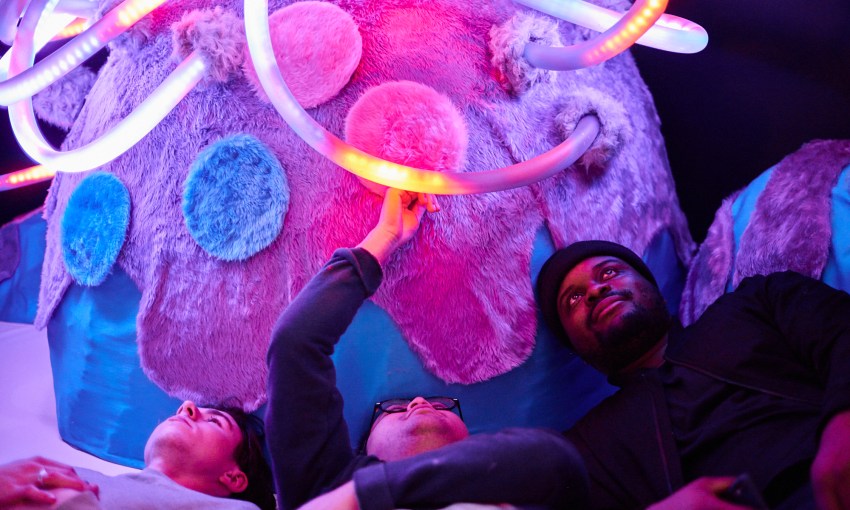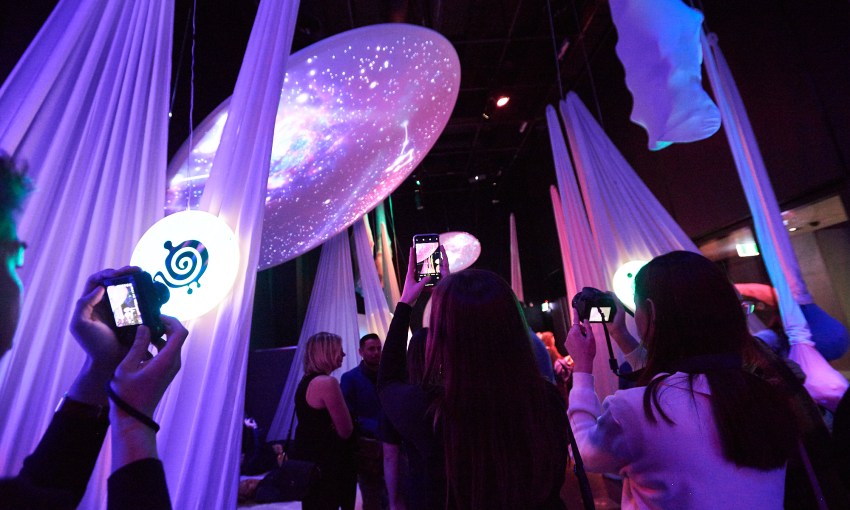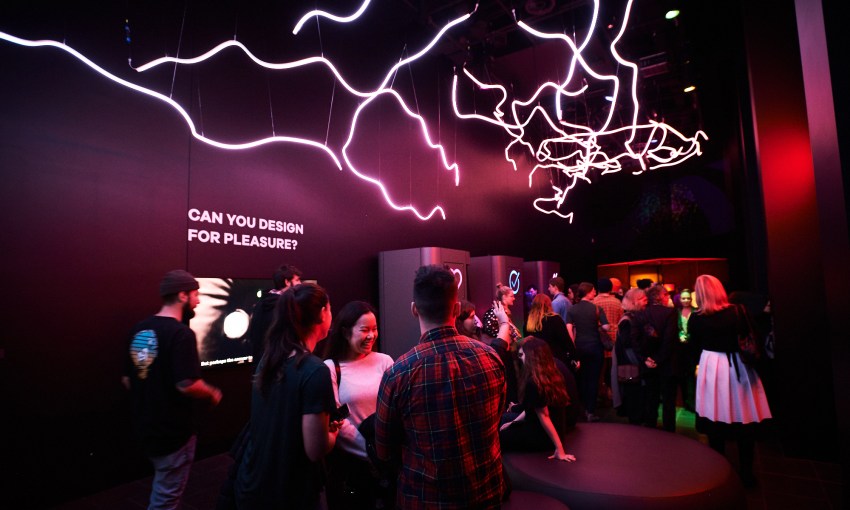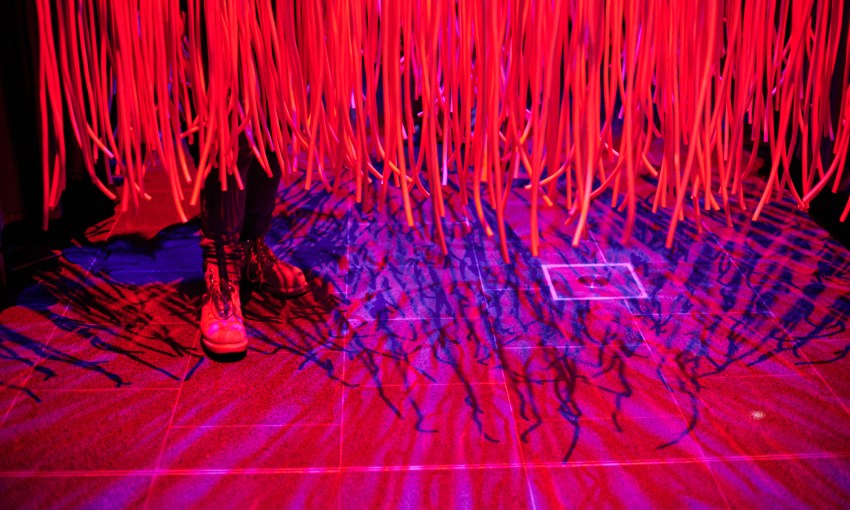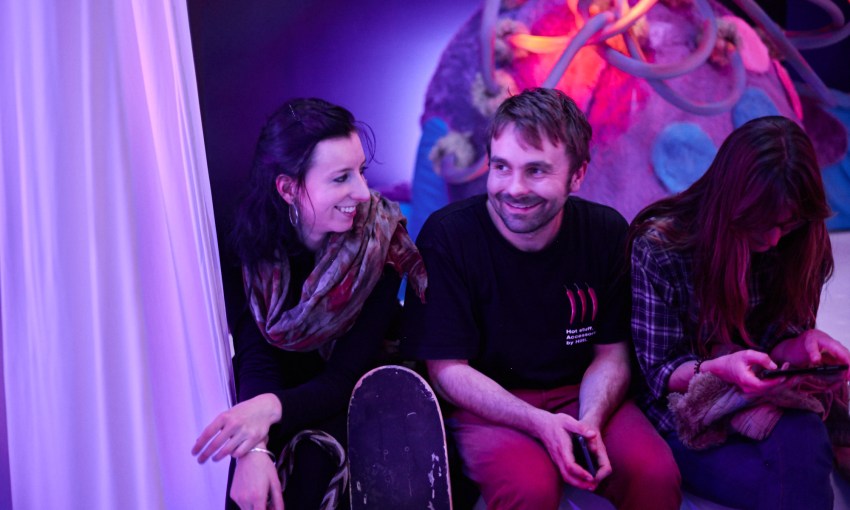One of the first institutions on North Terrace to close its doors to the public, MOD. is already fully operational online with a huge list of digital and interactive exhibits for you to visit. We speak with director of MOD. and futurist Dr Kristin Alford about art in the age of 'Life Interrupted.'
Of course Adelaide’s futuristic museum of discovery would be ready for COVID-19
Midway through MOD.’s post-apocalyptic exhibition, Seven Siblings from the Future, a real-world pandemic hit Australian shores.
In ordinary circumstances, a MOD. exhibition like Seven Siblings from the Future is built in about 18 months. The latest exhibition, Life Interrupted was created in just eight days.
MOD. on North Terrace is currently shut to the public, but you can visit the museum online and see their COVID-19 show: Life Interrupted.
At the centre of Life Interrupted is the topic of wellbeing and connectedness in a disrupted world. The exhibition is made up of some adapted works from previous exhibitions, as well as some brand new commissions.
MOD.’s commissioned game from its Waging Peace exhibition, Bad News Game, continues its campaign against misinformation, now with new relevancy in the context of a cluttered coronavirus media landscape. Click on the link if you want to ‘defrag’ your news feed.
The MOD. team have also set up camp in Minecraft – the uber-popular world-building game for kids. In this digital ‘block world’ MOD. is investigating whether a simulated environment can elicit the same health benefits as physically being in nature. The museum last tackled this question in its Hedonism exhibition.
What’s really cool about the Minecraft exhibit – or MOD.CRAFT as the team is calling it – is the fact that staff will be on hand in the Minecraft world online to engage with, answer your questions and even guide you through the exhibit.
There are 11 exhibits in total, but director of MOD. and real-life futurist Dr Kristin Alford says that number will expand and contract throughout the duration of the exhibition.
“We don’t have the opportunity to do that in the gallery space. You can’t just chuck something up and then take it down again, because that leaves an empty room. So that’s interesting, to be able to do something that is quite reactive and short-term,” she says.
It was important to Kristin though that Life Interrupted replicated the feeling of entering into an exhibit, despite it not existing in physical space.
“When you’re coming into our galleries, we’re asking you to do something, or touch something, or play something,” Kristin says.
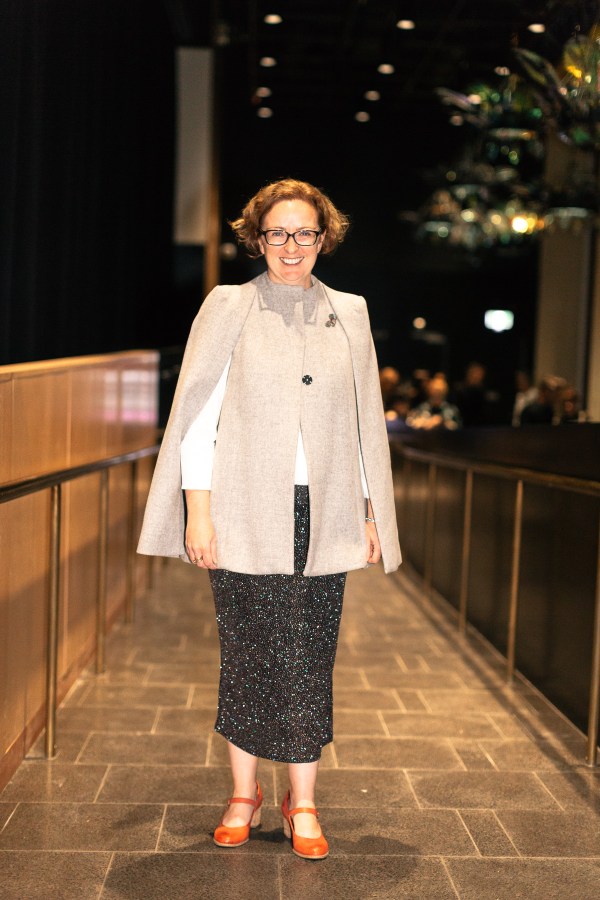
Dr Kristin Alford inside MOD. museum on North Terrace • This picture – Andrè Castellucci
Art in the age of COVID-19
Kristin tells CityMag at no point did she consider putting the museum and its staff on hiatus.
As someone who is usually good at weighing up all the available options, she laughs when we point out this could be construed as a considerable blind spot.
But with so much uncertainty currently permeating society, there is no better time for an institution like MOD. to exist.
“I’m so committed to that purpose of being meaningful for people that I felt like that was still a useful thing to be doing, and that we could continue to do that regardless,” Kristin says.
“The other thing on my mind was the wellbeing of the people I work with. I’ve got a core team of 12 people and we’ve got a casual staff group of almost 20 people, and I wanted to make sure we all had meaningful work as well.”
The most pressing concern in keeping MOD. going was how it could still achieve its goals online.

MOD. on Instagram
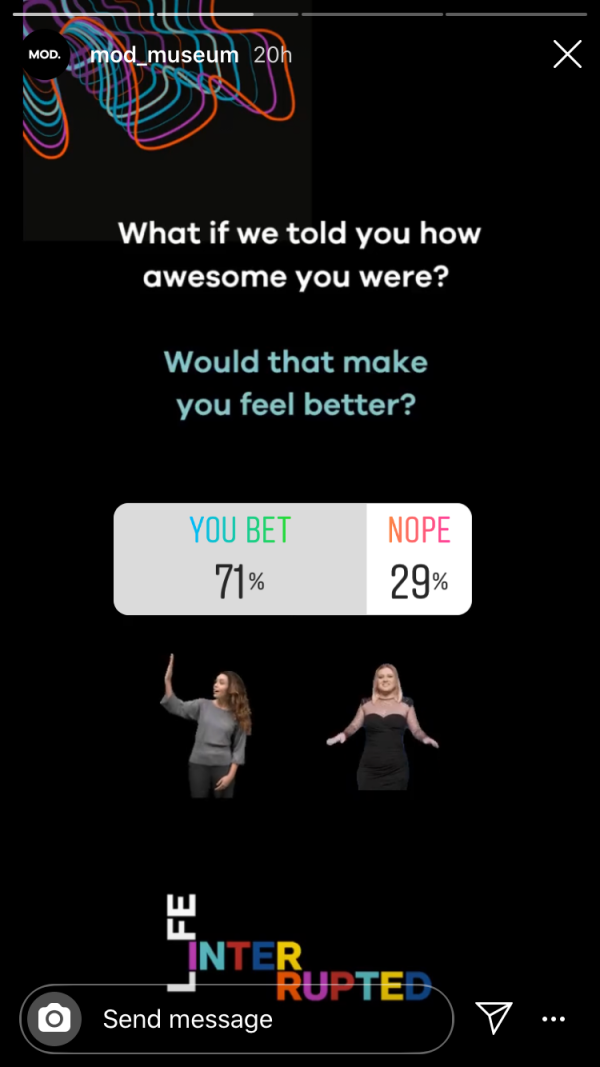
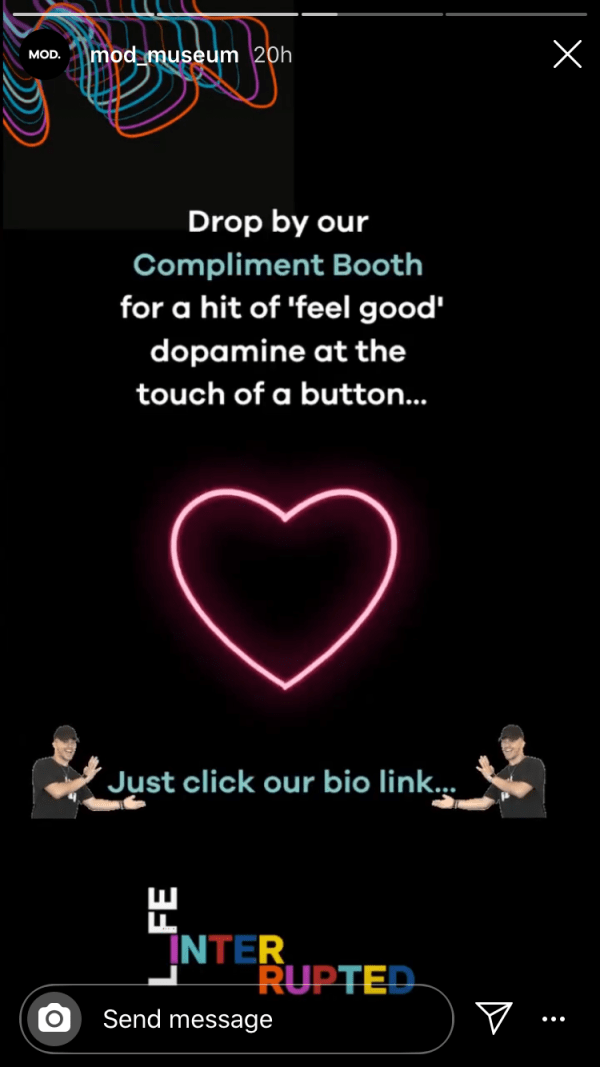
Kristin is a futurist and when she took the job as director of MOD., she considered what a 100-year future for the institution might look like.
The building itself “is only designed for 50 years,” she says, and so she had already considered that the longer-term existence of MOD. might exist more in the digital realm than the physical.
At that time, she had created two statements of intent for the museum: “we should be contributing to Adelaide as a centre of learning, and we should be helping young adults make sense of how to navigate their future.”
When formalising Life Interrupted, Kristin and the team used these statements as guideposts, making the exhibition’s goal much clearer.
“We do what we do: we put together a theme that we want to explore, where we can showcase research and have conversations,” she says.
Kristin is still now working with artists and researchers for upcoming additions to Life Interrupted, which will run until September, each exploring the themes of connectedness and wellbeing.
She will also replicate the usual in-person events, like the Life Interrupted digital launch party, which saw around 300 people stop by the event held on Facebook.
MOD.’s vision for the future
As we collectively charter through the choppy seas of this pandemic, slowly becoming accustomed to the throes of its tide, we are now starting to raise our eyes to the horizon and consider what it might mean for us to have our feet back on firm land.
Given her mind is so often engaged in future-thinking, CityMag asks Kristin if there will be a post-COVID-19 return to normalcy.
“The facetious answer to that is, ‘I hope not,’ because what we had wasn’t going to meet our future, anyway,” she says.
“My sense is that we want to return to stability, and that is possible, to come to a new notion of stable, but people have shifted behaviours and assumptions incredibly quickly in response, and so what seemed impossible a month ago is no longer impossible.
“People have been trying to get flexible working arrangements in corporations for years,” she laughs, “so what seemed impossible a month ago we’ve proven possible.
“If you think about grappling with issues of climate and needing action on that that wasn’t happening, and think about growing social inequity and that divide between rich and poor… The conversations we were having across the summer about increasing domestic violence and the response of being able to make a difference in that, or at least even focussing on that to make a difference.
“Do we return to normal? Hopefully not. Do we return to a space with stability? I think that’s what people would like, and… I think that is possible.
“But it would be nice to think that some of those other issues that we’ve been grappling with might also be tackled.
“I think the worst outcome for us would be if we try and force ourselves back to what is normal, because what I think that will do is entrench some of those problems even more deeply, and that would be a missed opportunity.”
Since its inception, MOD. has always existed in a strange place, hovering between museum, art gallery and science centre.
For traditional collecting institutions, like museums and galleries, their role now, as it has always been, is to collect artefacts and artworks that document the particularities of this moment in time.
These collections will provide answers to the questions future generations will ask about what it was like to live through a pandemic in the year 2020.

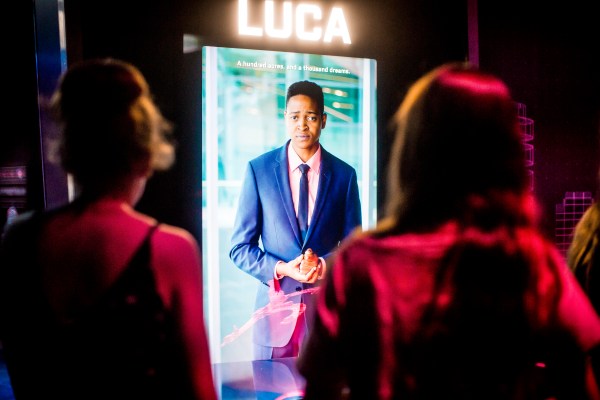
Meet Luca – your sibling from the future
For MOD., the inverse role applies – where there is uncertainty, Kristin and the MOD. team will dig deeper and ask loftier questions, all with grand aim of providing a space for people to find the answers on their own.
“This is hugely exciting because we can start lots of exciting, interesting things, where there’s lots of unknowns. We don’t know how they’re going to go,” Kristin says.
“I’m really enjoying the work that we’re doing, I’m really excited about what we’re putting out there, I’m really excited about the ability to play, and to still meet our mission and to inspire people and to add, with meaning, things for people to interact with and be inspired by.”

You can visit this exhibit online here



